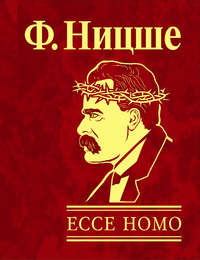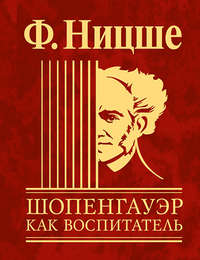 полная версия
полная версияHuman, All-Too-Human: A Book For Free Spirits; Part II
Envy with or without a Mouthpiece. – Ordinary envy is wont to cackle when the envied hen has laid an egg, thereby relieving itself and becoming milder. But there is a yet deeper envy that in such a case becomes dead silent, desiring that every mouth should be sealed and always more and more angry because this desire is not gratified. Silent envy grows in silence.
54Anger as a Spy. – Anger exhausts the soul and brings its very dregs to light. Hence, if we know no other means of gaining certainty, we must understand how to arouse anger in our dependents and adversaries, in order to learn what is really done and thought to our detriment.
55Defence Morally more Difficult than Attack. – The true heroic deed and masterpiece of the good man does not lie in attacking opinions and continuing to love their propounders, but in the far harder task of defending his own position without causing or intending to cause bitter heartburns to his opponent. The sword of attack is honest and broad, the sword of defence usually runs out to a needle point.
56Honest towards Honesty. – One who is openly honest towards himself ends by being rather conceited about this honesty. He knows only too well why he is honest – for the same reason that another man prefers outward show and hypocrisy.
57Coals of Fire. – The heaping of coals of fire on another's head is generally misunderstood and falls flat, because the other knows himself to be just as much in the right, and on his side too has thought of collecting coals.
58Dangerous Books. – A man says: “Judging from my own case, I find that this book is harmful.” Let him but wait, and perhaps one day he will confess that the book did him a great service by thrusting forward and bringing to light the hidden disease of his soul. – Altered opinions alter not at all (or very little) the character of a man: but they illuminate individual facets of his personality, which hitherto, in another constellation of opinions, had remained dark and unrecognisable.
59Simulated Pity. – We simulate pity when we wish to show ourselves superior to the feeling of animosity, but generally in vain. This point is not noticed without a considerable enhancement of that feeling of animosity.
60Open Contradiction often Conciliatory. – At the moment when a man openly makes known his difference of opinion from a well-known party leader, the whole world thinks that he must be angry with the latter. Sometimes, however, he is just on the point of ceasing to be angry with him. He ventures to put himself on the same plane as his opponent, and is free from the tortures of suppressed envy.
61Seeing our Light Shining. – In the darkest hour of depression, sickness, and guilt, we are still glad to see others taking a light from us and making use of us as of the disk of the moon. By this roundabout route we derive some light from our own illuminating faculty.
62Fellowship in Joy.5– The snake that stings us means to hurt us and rejoices in so doing: the lowest animal can picture to itself the pain of others. But to picture to oneself the joy of others and to rejoice thereat is the highest privilege of the highest animals, and again, amongst them, is the property only of the most select specimens – accordingly a rare “human thing.” Hence there have been philosophers who denied fellowship in joy.
63Supplementary Pregnancy.– Those who have arrived at works and deeds are in an obscure way, they know not how, all the more pregnant with them, as if to prove supplementarily that these are their children and not those of chance.
64Hard-hearted from Vanity. – Just as justice is so often a cloak for weakness, so men who are fairly intelligent, but weak, sometimes attempt dissimulation from ambitious motives and purposely show themselves unjust and hard, in order to leave behind them the impression of strength.
65Humiliation. – If in a large sack of profit we find a single grain of humiliation we still make a wry face even at our good luck.
66Extreme Herostratism.6– There might be Herostratuses who set fire to their own temple, in which their images are honoured.
67A World of Diminutives. – The fact that all that is weak and in need of help appeals to the heart induces in us the habit of designating by diminutive and softening terms all that appeals to our hearts – and accordingly making such things weak and clinging to our imaginations.
68The Bad Characteristic of Sympathy. – Sympathy has a peculiar impudence for its companion. For, wishing to help at all costs, sympathy is in no perplexity either as to the means of assistance or as to the nature and cause of the disease, and goes on courageously administering all its quack medicines to restore the health and reputation of the patient.
69Importunacy. – There is even an importunacy in relation to works, and the act of associating oneself from early youth on an intimate footing with the illustrious works of all times evinces an entire absence of shame. – Others are only importunate from ignorance, not knowing with whom they have to do – for instance classical scholars young and old in relation to the works of the Greeks.
70The Will is Ashamed of the Intellect. – In all coolness we make reasonable plans against our passions. But we make the most serious mistake in this connection in being often ashamed, when the design has to be carried out, of the coolness and calculation with which we conceived it. So we do just the unreasonable thing, from that sort of defiant magnanimity that every passion involves.
71Why the Sceptics Offend Morality. – He who takes his morality solemnly and seriously is enraged against the sceptics in the domain of morals. For where he lavishes all his force, he wishes others to marvel but not to investigate and doubt. Then there are natures whose last shred of morality is just the belief in morals. They behave in the same way towards sceptics, if possible still more passionately.
72Shyness. – All moralists are shy, because they know they are confounded with spies and traitors, so soon as their penchant is noticed. Besides, they are generally conscious of being impotent in action, for in the midst of work the motives of their activity almost withdraw their attention from the work.
73A Danger to Universal Morality. – People who are at the same time noble and honest come to deify every devilry that brings out their honesty, and to suspend for a time the balance of their moral judgment.
74The Saddest Error. – It is an unpardonable offence when one discovers that where one was convinced of being loved, one is only regarded as a household utensil and decoration, whereby the master of the house can find an outlet for his vanity before his guests.
75Love and Duality. – What else is love but understanding and rejoicing that another lives, works, and feels in a different and opposite way to ourselves? That love may be able to bridge over the contrasts by joys, we must not remove or deny those contrasts. Even self-love presupposes an irreconcileable duality (or plurality) in one person.
76Signs from Dreams. – What one sometimes does not know and feel accurately in waking hours – whether one has a good or a bad conscience as regards some person – is revealed completely and unambiguously by dreams.
77Debauchery. – Not joy but joylessness is the mother of debauchery.
78Reward and Punishment. – No one accuses without an underlying notion of punishment and revenge, even when he accuses his fate or himself. All complaint is accusation, all self-congratulation is praise. Whether we do one or the other, we always make some one responsible.
79Doubly Unjust. – We sometimes advance truth by a twofold injustice: when we see and represent consecutively the two sides of a case which we are not in a position to see together, but in such a way that every time we mistake or deny the other side, fancying that what we see is the whole truth.
80Mistrust. – Self-mistrust does not always proceed uncertainly and shyly, but sometimes in a furious rage, having worked itself into a frenzy in order not to tremble.
81Philosophy of Parvenus. – If you want to be a personality you must even hold your shadow in honour.
82Knowing how to Wash Oneself Clean. – We must know how to emerge cleaner from unclean conditions, and, if necessary, how to wash ourselves even with dirty water.
83Letting Yourself Go. – The more you let yourself go, the less others let you go.
84The Innocent Rogue. – There is a slow, gradual path to vice and rascality of every description. In the end, the traveller is quite abandoned by the insect-swarms of a bad conscience, and although a thorough scoundrel he walks in innocence.
85Making Plans. – Making plans and conceiving projects involves many agreeable sentiments. He that had the strength to be nothing but a contriver of plans all his life would be a happy man. But one must occasionally have a rest from this activity by carrying a plan into execution, and then comes anger and sobriety.
86Wherewith We See the Ideal. – Every efficient man is blocked by his efficiency and cannot look out freely from its prison. Had he not also a goodly share of imperfection, he could, by reason of his virtue, never arrive at an intellectual or moral freedom. Our shortcomings are the eyes with which we see the ideal.
87Dishonest Praise. – Dishonest praise causes many more twinges of conscience than dishonest blame, probably only because we have exposed our capacity for judgment far more completely through excessive praise than through excessive and unjust blame.
88How One Dies is Indifferent. – The whole way in which a man thinks of death during the prime of his life and strength is very expressive and significant for what we call his character. But the hour of death itself, his behaviour on the death-bed, is almost indifferent. The exhaustion of waning life, especially when old people die, the irregular or insufficient nourishment of the brain during this last period, the occasionally violent pain, the novel and untried nature of the whole position, and only too often the ebb and flow of superstitious impressions and fears, as if dying were of much consequence and meant the crossing of bridges of the most terrible kind – all this forbids our using death as a testimony concerning the living. Nor is it true that the dying man is generally more honest than the living. On the contrary, through the solemn attitude of the bystanders, the repressed or flowing streams of tears and emotions, every one is inveigled into a comedy of vanity, now conscious, now unconscious. The serious way in which every dying man is treated must have been to many a poor despised devil the highest joy of his whole life and a sort of compensation and repayment for many privations.
89Morality and its Sacrifice. – The origin of morality may be traced to two ideas: “The community is of more value than the individual,” and “The permanent interest is to be preferred to the temporary.” The conclusion drawn is that the permanent interest of the community is unconditionally to be set above the temporary interest of the individual, especially his momentary well-being, but also his permanent interest and even the prolongation of his existence. Even if the individual suffers by an arrangement that suits the mass, even if he is depressed and ruined by it, morality must be maintained and the victim brought to the sacrifice. Such a trend of thought arises, however, only in those who are not the victims – for in the victim's case it enforces the claim that the individual might be worth more than the many, and that the present enjoyment, the “moment in paradise,”7 should perhaps be rated higher than a tame succession of untroubled or comfortable circumstances. But the philosophy of the sacrificial victim always finds voice too late, and so victory remains with morals and morality: which are really nothing more than the sentiment for the whole concept of morals under which one lives and has been reared – and reared not as an individual but as a member of the whole, as a cipher in a majority. Hence it constantly happens that the individual makes himself into a majority by means of his morality.
90The Good and the Good Conscience. – You hold that all good things have at all times had a good conscience? Science, which is certainly a very good thing, has come into the world without such a conscience and quite free from all pathos, rather clandestinely, by roundabout ways, walking with shrouded or masked face like a sinner, and always with the feeling at least of being a smuggler. Good conscience has bad conscience for its stepping-stone, not for its opposite. For all that is good has at one time been new and consequently strange, against morals, immoral, and has gnawed like a worm at the heart of the fortunate discoverer.
91Success Sanctifies the Intentions. – We should not shrink from treading the road to a virtue, even when we see clearly that nothing but egotism, and accordingly utility, personal comfort, fear, considerations of health, reputation, or glory, are the impelling motives. These motives are styled ignoble and selfish. Very well, but if they stimulate us to some virtue – for example, self-denial, dutifulness, order, thrift, measure, and moderation – let us listen to them, whatever their epithets may be! For if we reach the goal to which they summon us, then the virtue we have attained, by means of the pure air it makes us breathe and the spiritual well-being it communicates, ennobles the remoter impulses of our action, and afterwards we no longer perform those actions from the same coarse motives that inspired us before. – Education should therefore force the virtues on the pupil, as far as possible, according to his disposition. Then virtue, the sunshine and summer atmosphere of the soul, can contribute her own share of work and add mellowness and sweetness.
92Dabblers in Christianity, not Christians. – So that is your Christianity! – To annoy humanity you praise “God and His Saints,” and again when you want to praise humanity you go so far that God and His Saints must be annoyed. – I wish you would at least learn Christian manners, as you are so deficient in the civility of the Christian heart.
93The Religious and Irreligious Impression of Nature. – A true believer must be to us an object of veneration, but the same holds good of a true, sincere, convinced unbeliever. With men of the latter stamp we are near to the high mountains where mighty rivers have their source, and with believers we are under vigorous, shady, restful trees.
94Judicial Murder. – The two greatest judicial murders8 in the world's history are, to speak without exaggeration, concealed and well-concealed suicide. In both cases a man willed to die, and in both cases he let his breast be pierced by the sword in the hand of human injustice.
95“Love.” – The finest artistic conception wherein Christianity had the advantage over other religious systems lay in one word – Love. Hence it became the lyric religion (whereas in its two other creations Semitism bestowed heroico-epical religions upon the world). In the word “love” there is so much meaning, so much that stimulates and appeals to memory and hope, that even the meanest intelligence and the coldest heart feel some glimmering of its sense. The cleverest woman and the lowest man think of the comparatively unselfish moments of their whole life, even if with them Eros never soared high: and the vast number of beings who miss love from their parents or children or sweethearts, especially those whose sexual instincts have been refined away, have found their heart's desire in Christianity.
96The Fulfilment of Christianity. – In Christianity there is also an Epicurean trend of thought, starting from the idea that God can only demand of man, his creation and his image, what it is possible for man to fulfil, and accordingly that Christian virtue and perfection are attainable and often attained. Now, for instance, the belief in loving one's enemies – even if it is only a belief or fancy, and by no means a psychological reality (a real love) – gives unalloyed happiness, so long as it is genuinely believed. (As to the reason of this, psychologist and Christian might well differ.) Hence earthly life, through the belief, I mean the fancy, that it satisfies not only the injunction to love our enemies, but all the other injunctions of Christianity, and that it has really assimilated and embodied in itself the Divine perfection according to the command, “Be perfect as your Father in heaven is perfect,” might actually become a holy life. Thus error can make Christ's promise come true.
97Of the Future of Christianity. – We may be allowed to form a conjecture as to the disappearance of Christianity and as to the places where it will be the slowest to retreat, if we consider where and for what reasons Protestantism spread with such startling rapidity. As is well known, Protestantism promised to do far more cheaply all that the old Church did, without costly masses, pilgrimages, and priestly pomp and circumstance. It spread particularly among the Northern nations, which were not so deeply rooted as those of the South in the old Church's symbolism and love of ritual. In the South the more powerful pagan religion survived in Christianity, whereas in the North Christianity meant an opposition to and a break with the old-time creed, and hence was from the first more thoughtful and less sensual, but for that very reason, in times of peril, more fanatical and more obstinate. If from the standpoint of thought we succeed in uprooting Christianity, we can at once know the point where it will begin to disappear – the very point at which it will be most stubborn in defence. In other places it will bend but not break, lose its leaves but burst into leaf afresh, because the senses, and not thought, have gone over to its side. But it is the senses that maintain the belief that with all its expensive outlay the Church is more cheaply and conveniently managed than under the stern conditions of work and wages. Yet what does one hold leisure (or semi-idleness) to be worth, when once one has become accustomed to it? The senses plead against a dechristianised world, saying that there would be too much work to do in it and an insufficient supply of leisure. They take the part of magic – that is, they let God work himself (oremus nos, Deus laboret).
98Theatricality and Honesty of Unbelievers. – There is no book that contains in such abundance or expresses so faithfully all that man occasionally finds salutary – ecstatic inward happiness, ready for sacrifice or death in the belief in and contemplation of his truth – as the book that tells of Christ. From that book a clever man may learn all the means whereby a book can be made into a world-book, a vade-mecum for all, and especially that master-means of representing everything as discovered, nothing as future and uncertain. All influential books try to leave the same impression, as if the widest intellectual horizon were circumscribed here and as if about the sun that shines here every constellation visible at present or in the future must revolve. – Must not then all purely scientific books be poor in influence on the same grounds as such books are rich in influence? Is not the book fated to live humble and among humble folk, in order to be crucified in the end and never resurrected? In relation to what the religious inform us of their “knowledge” and their “holy spirit,” are not all upright men of science “poor in spirit”? Can any religion demand more self-denial and draw the selfish out of themselves more inexorably than science? – This and similar things we may say, in any case with a certain theatricality, when we have to defend ourselves against believers, for it is impossible to conduct a defence without a certain amount of theatricality. But between ourselves our language must be more honest, and we employ a freedom that those believers are not even allowed, in their own interests, to understand. Away, then, with the monastic cowl of self-denial, with the appearance of humility! Much more and much better – so rings our truth! If science were not linked with the pleasure of knowledge, the utility of the thing known, what should we care for science? If a little faith, love, and hope did not lead our souls to knowledge, what would attract us to science? And if in science the ego means nothing, still the inventive, happy ego, every upright and industrious ego, means a great deal in the republic of the men of science. The homage of those who pay homage, the joy of those whom we wish well or honour, in some cases glory and a fair share of immortality, is the personal reward for every suppression of personality: to say nothing here of meaner views and rewards, although it is just on this account that the majority have sworn and always continue to swear fidelity to the laws of the republic and of science. If we had not remained in some degree unscientific, what would science matter to us? Taking everything together and speaking in plain language: “To a purely knowing being knowledge would be indifferent.” – Not the quality but the quantity of faith and devoutness distinguishes us from the pious, the believers. We are content with less. But should one of them cry out to us: “Be content and show yourselves contented!” we could easily answer: “As a matter of fact, we do not belong to the most discontented class. But you, if your faith makes you happy, show yourselves to be happy. Your faces have always done more harm to your faith than our reasons! If that glad message of your Bible were written in your faces, you would not need to demand belief in the authority of that book in such stiff-necked fashion. Your words, your actions should continually make the Bible superfluous – in fact, through you a new Bible should continually come into being. As it is, your apologia for Christianity is rooted in your unchristianity, and with your defence you write your own condemnation. If you, however, should wish to emerge from your dissatisfaction with Christianity, you should ponder over the experience of two thousand years, which, clothed in the modest form of a question, may be voiced as follows: ‘If Christ really intended to redeem the world, may he not be said to have failed?’ ”
99The Poet as Guide to the Future. – All the surplus poetical force that still exists in modern humanity, but is not used under our conditions of life, should (without any deduction) be devoted to a definite goal – not to depicting the present nor to reviving and summarising the past, but to pointing the way to the future. Nor should this be so done as if the poet, like an imaginative political economist, had to anticipate a more favourable national and social state of things and picture their realisation. Rather will he, just as the earlier poets portrayed the images of the Gods, portray the fair images of men. He will divine those cases where, in the midst of our modern world and reality (which will not be shirked or repudiated in the usual poetic fashion), a great, noble soul is still possible, where it may be embodied in harmonious, equable conditions, where it may become permanent, visible, and representative of a type, and so, by the stimulus to imitation and envy, help to create the future. The poems of such a poet would be distinguished by appearing secluded and protected from the heated atmosphere of the passions. The irremediable failure, the shattering of all the strings of the human instrument, the scornful laughter and gnashing of teeth, and all tragedy and comedy in the usual old sense, would appear by the side of this new art as mere archaic lumber, a blurring of the outlines of the world-picture. Strength, kindness, gentleness, purity, and an unsought, innate moderation in the personalities and their action: a levelled soil, giving rest and pleasure to the foot: a shining heaven mirrored in faces and events: science and art welded into a new unity: the mind living together with her sister, the soul, without arrogance or jealousy, and enticing from contrasts the grace of seriousness, not the impatience of discord – all this would be the general environment, the background on which the delicate differences of the embodied ideals would make the real picture, that of ever-growing human majesty. Many roads to this poetry of the future start from Goethe, but the quest needs good pathfinders and above all a far greater strength than is possessed by modern poets, who unscrupulously represent the half-animal and the immaturity and intemperance that are mistaken by them for power and naturalness.









